
Previous in Relation and Functions Next in Relation and Functions
Question Number 17093 by 1234Hello last updated on 02/Jul/17
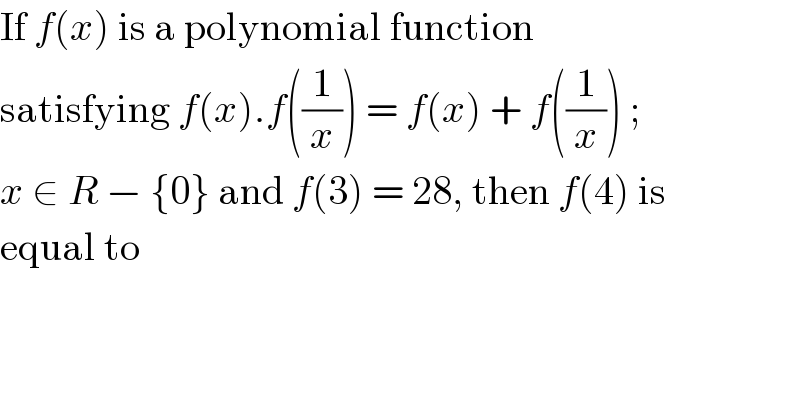
$$\mathrm{If}\:{f}\left({x}\right)\:\mathrm{is}\:\mathrm{a}\:\mathrm{polynomial}\:\mathrm{function} \\ $$$$\mathrm{satisfying}\:{f}\left({x}\right).{f}\left(\frac{\mathrm{1}}{{x}}\right)\:=\:{f}\left({x}\right)\:+\:{f}\left(\frac{\mathrm{1}}{{x}}\right)\:; \\ $$$${x}\:\in\:{R}\:−\:\left\{\mathrm{0}\right\}\:\mathrm{and}\:{f}\left(\mathrm{3}\right)\:=\:\mathrm{28},\:\mathrm{then}\:{f}\left(\mathrm{4}\right)\:\mathrm{is} \\ $$$$\mathrm{equal}\:\mathrm{to} \\ $$
Commented by prakash jain last updated on 30/Jun/17
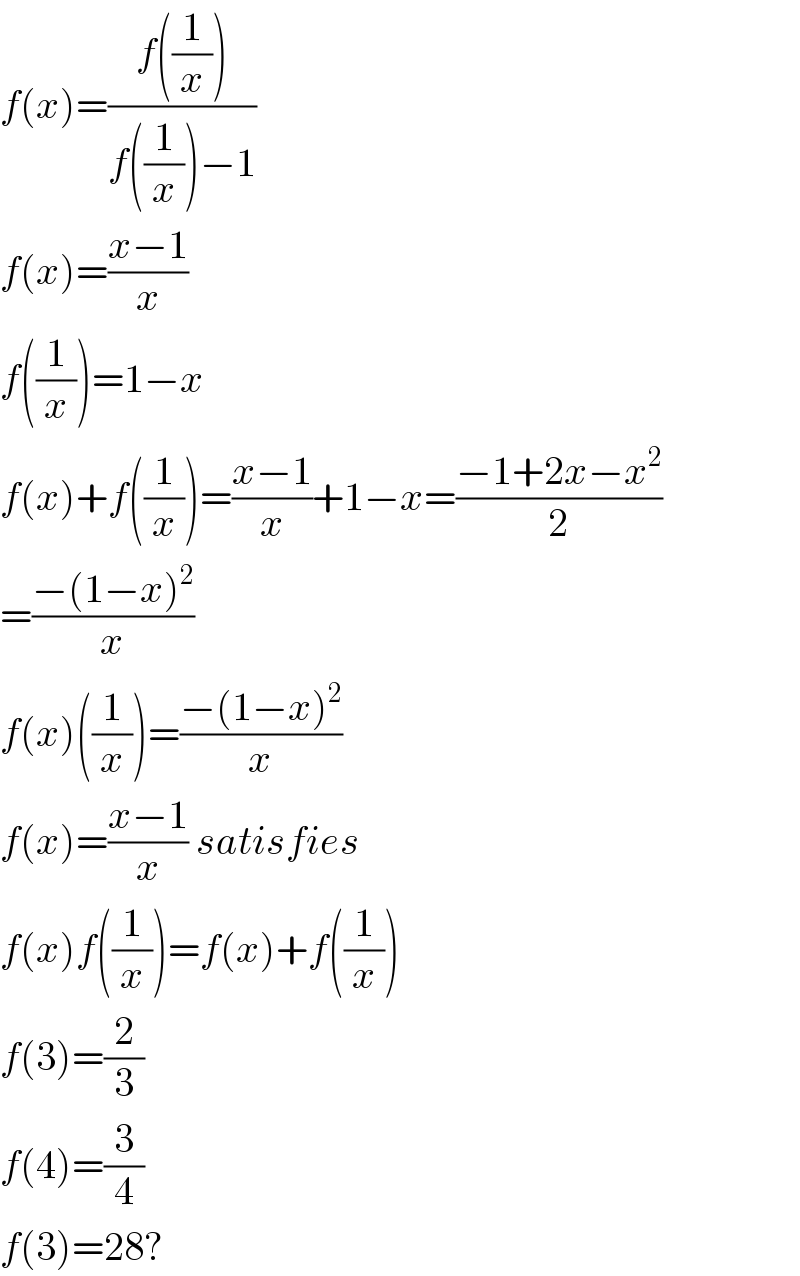
$${f}\left({x}\right)=\frac{{f}\left(\frac{\mathrm{1}}{{x}}\right)}{{f}\left(\frac{\mathrm{1}}{{x}}\right)−\mathrm{1}} \\ $$$${f}\left({x}\right)=\frac{{x}−\mathrm{1}}{{x}} \\ $$$${f}\left(\frac{\mathrm{1}}{{x}}\right)=\mathrm{1}−{x} \\ $$$${f}\left({x}\right)+{f}\left(\frac{\mathrm{1}}{{x}}\right)=\frac{{x}−\mathrm{1}}{{x}}+\mathrm{1}−{x}=\frac{−\mathrm{1}+\mathrm{2}{x}−{x}^{\mathrm{2}} }{\mathrm{2}} \\ $$$$=\frac{−\left(\mathrm{1}−{x}\right)^{\mathrm{2}} }{{x}} \\ $$$${f}\left({x}\right)\left(\frac{\mathrm{1}}{{x}}\right)=\frac{−\left(\mathrm{1}−{x}\right)^{\mathrm{2}} }{{x}} \\ $$$${f}\left({x}\right)=\frac{{x}−\mathrm{1}}{{x}}\:{satisfies} \\ $$$${f}\left({x}\right){f}\left(\frac{\mathrm{1}}{{x}}\right)={f}\left({x}\right)+{f}\left(\frac{\mathrm{1}}{{x}}\right) \\ $$$${f}\left(\mathrm{3}\right)=\frac{\mathrm{2}}{\mathrm{3}} \\ $$$${f}\left(\mathrm{4}\right)=\frac{\mathrm{3}}{\mathrm{4}} \\ $$$${f}\left(\mathrm{3}\right)=\mathrm{28}? \\ $$
Commented by mrW1 last updated on 01/Jul/17
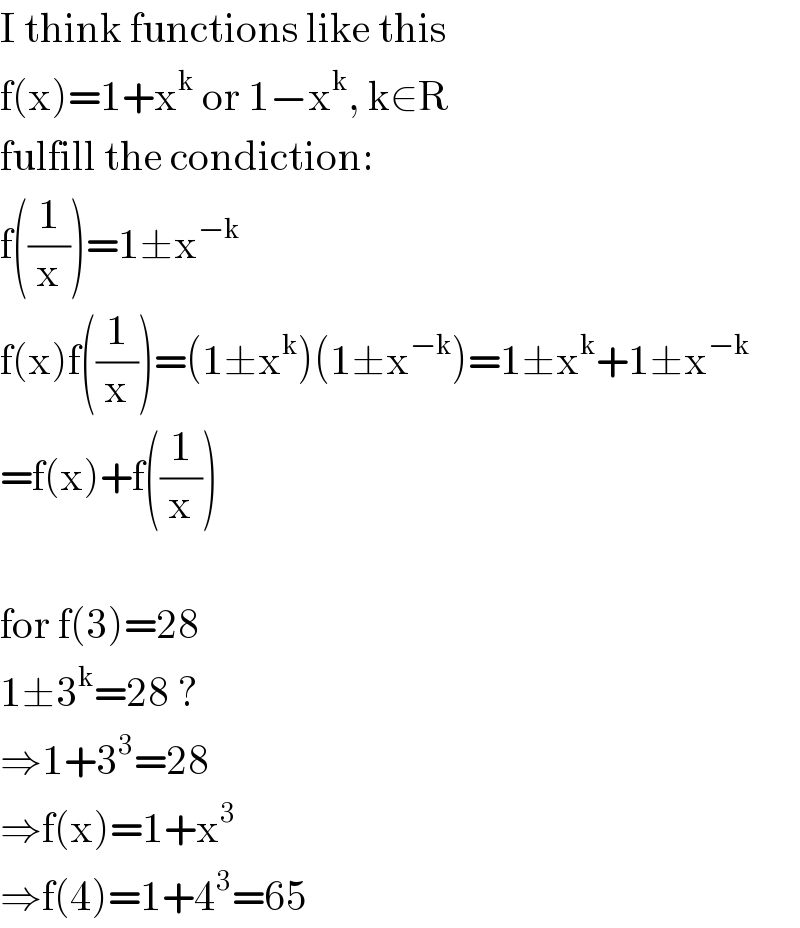
$$\mathrm{I}\:\mathrm{think}\:\mathrm{functions}\:\mathrm{like}\:\mathrm{this} \\ $$$$\mathrm{f}\left(\mathrm{x}\right)=\mathrm{1}+\mathrm{x}^{\mathrm{k}} \:\mathrm{or}\:\mathrm{1}−\mathrm{x}^{\mathrm{k}} ,\:\mathrm{k}\in\mathrm{R} \\ $$$$\mathrm{fulfill}\:\mathrm{the}\:\mathrm{condiction}: \\ $$$$\mathrm{f}\left(\frac{\mathrm{1}}{\mathrm{x}}\right)=\mathrm{1}\pm\mathrm{x}^{−\mathrm{k}} \\ $$$$\mathrm{f}\left(\mathrm{x}\right)\mathrm{f}\left(\frac{\mathrm{1}}{\mathrm{x}}\right)=\left(\mathrm{1}\pm\mathrm{x}^{\mathrm{k}} \right)\left(\mathrm{1}\pm\mathrm{x}^{−\mathrm{k}} \right)=\mathrm{1}\pm\mathrm{x}^{\mathrm{k}} +\mathrm{1}\pm\mathrm{x}^{−\mathrm{k}} \\ $$$$=\mathrm{f}\left(\mathrm{x}\right)+\mathrm{f}\left(\frac{\mathrm{1}}{\mathrm{x}}\right) \\ $$$$ \\ $$$$\mathrm{for}\:\mathrm{f}\left(\mathrm{3}\right)=\mathrm{28} \\ $$$$\mathrm{1}\pm\mathrm{3}^{\mathrm{k}} =\mathrm{28}\:? \\ $$$$\Rightarrow\mathrm{1}+\mathrm{3}^{\mathrm{3}} =\mathrm{28} \\ $$$$\Rightarrow\mathrm{f}\left(\mathrm{x}\right)=\mathrm{1}+\mathrm{x}^{\mathrm{3}} \\ $$$$\Rightarrow\mathrm{f}\left(\mathrm{4}\right)=\mathrm{1}+\mathrm{4}^{\mathrm{3}} =\mathrm{65} \\ $$
Commented by mrW1 last updated on 01/Jul/17
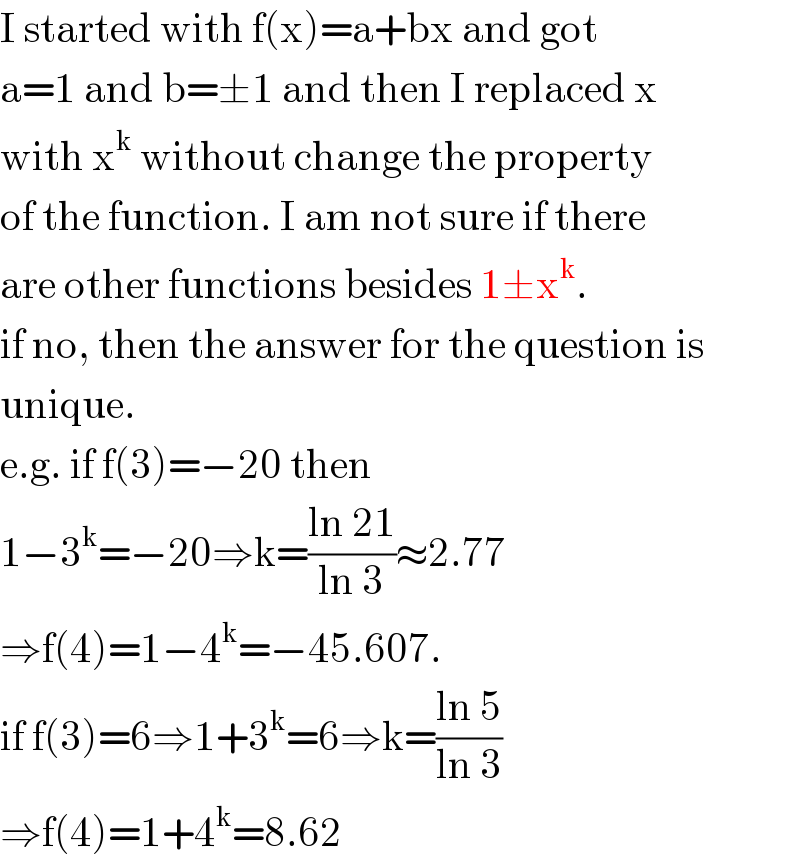
$$\mathrm{I}\:\mathrm{started}\:\mathrm{with}\:\mathrm{f}\left(\mathrm{x}\right)=\mathrm{a}+\mathrm{bx}\:\mathrm{and}\:\mathrm{got} \\ $$$$\mathrm{a}=\mathrm{1}\:\mathrm{and}\:\mathrm{b}=\pm\mathrm{1}\:\mathrm{and}\:\mathrm{then}\:\mathrm{I}\:\mathrm{replaced}\:\mathrm{x} \\ $$$$\mathrm{with}\:\mathrm{x}^{\mathrm{k}} \:\mathrm{without}\:\mathrm{change}\:\mathrm{the}\:\mathrm{property} \\ $$$$\mathrm{of}\:\mathrm{the}\:\mathrm{function}.\:\mathrm{I}\:\mathrm{am}\:\mathrm{not}\:\mathrm{sure}\:\mathrm{if}\:\mathrm{there} \\ $$$$\mathrm{are}\:\mathrm{other}\:\mathrm{functions}\:\mathrm{besides}\:\mathrm{1}\pm\mathrm{x}^{\mathrm{k}} . \\ $$$$\mathrm{if}\:\mathrm{no},\:\mathrm{then}\:\mathrm{the}\:\mathrm{answer}\:\mathrm{for}\:\mathrm{the}\:\mathrm{question}\:\mathrm{is} \\ $$$$\mathrm{unique}. \\ $$$$\mathrm{e}.\mathrm{g}.\:\mathrm{if}\:\mathrm{f}\left(\mathrm{3}\right)=−\mathrm{20}\:\mathrm{then} \\ $$$$\mathrm{1}−\mathrm{3}^{\mathrm{k}} =−\mathrm{20}\Rightarrow\mathrm{k}=\frac{\mathrm{ln}\:\mathrm{21}}{\mathrm{ln}\:\mathrm{3}}\approx\mathrm{2}.\mathrm{77} \\ $$$$\Rightarrow\mathrm{f}\left(\mathrm{4}\right)=\mathrm{1}−\mathrm{4}^{\mathrm{k}} =−\mathrm{45}.\mathrm{607}. \\ $$$$\mathrm{if}\:\mathrm{f}\left(\mathrm{3}\right)=\mathrm{6}\Rightarrow\mathrm{1}+\mathrm{3}^{\mathrm{k}} =\mathrm{6}\Rightarrow\mathrm{k}=\frac{\mathrm{ln}\:\mathrm{5}}{\mathrm{ln}\:\mathrm{3}} \\ $$$$\Rightarrow\mathrm{f}\left(\mathrm{4}\right)=\mathrm{1}+\mathrm{4}^{\mathrm{k}} =\mathrm{8}.\mathrm{62} \\ $$
Commented by Tinkutara last updated on 01/Jul/17

$$\mathrm{Thanks}\:\mathrm{Sirs}! \\ $$
Commented by prakash jain last updated on 01/Jul/17
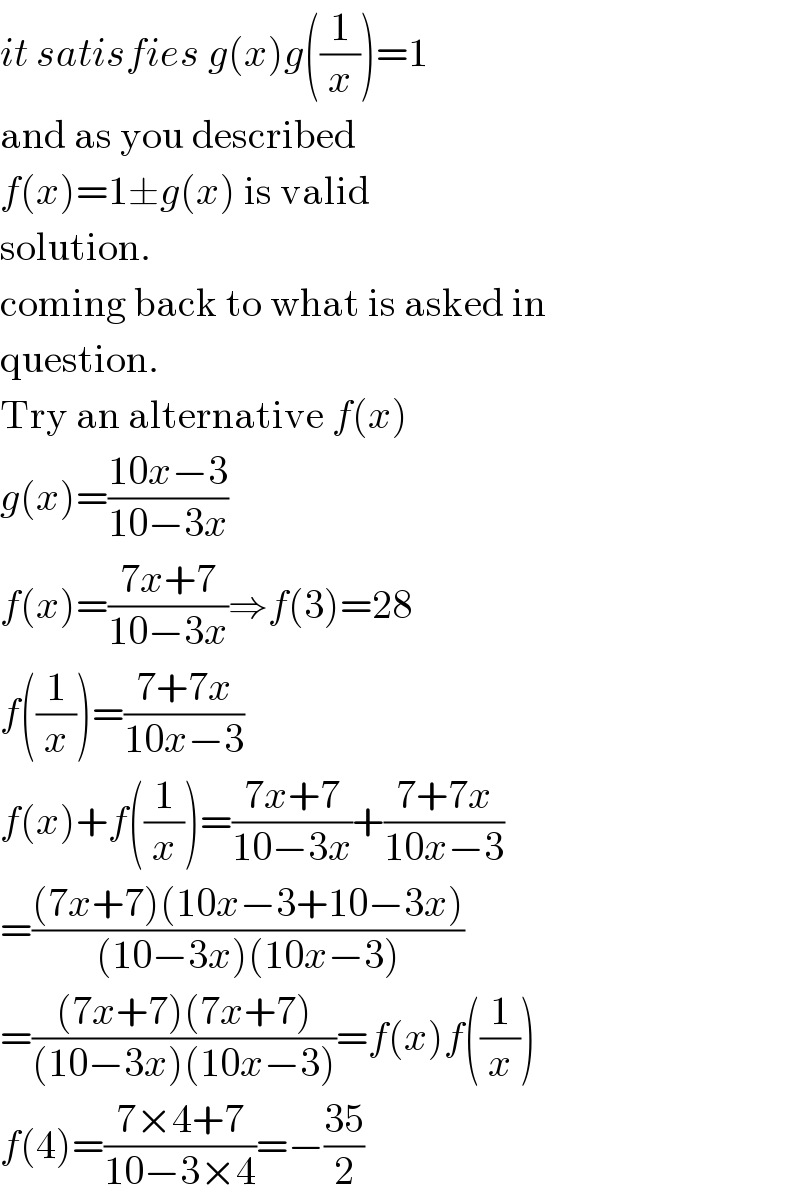
$${it}\:{satisfies}\:{g}\left({x}\right){g}\left(\frac{\mathrm{1}}{{x}}\right)=\mathrm{1} \\ $$$$\mathrm{and}\:\mathrm{as}\:\mathrm{you}\:\mathrm{described} \\ $$$${f}\left({x}\right)=\mathrm{1}\pm{g}\left({x}\right)\:\mathrm{is}\:\mathrm{valid} \\ $$$$\mathrm{solution}. \\ $$$$\mathrm{coming}\:\mathrm{back}\:\mathrm{to}\:\mathrm{what}\:\mathrm{is}\:\mathrm{asked}\:\mathrm{in} \\ $$$$\mathrm{question}. \\ $$$$\mathrm{Try}\:\mathrm{an}\:\mathrm{alternative}\:{f}\left({x}\right) \\ $$$${g}\left({x}\right)=\frac{\mathrm{10}{x}−\mathrm{3}}{\mathrm{10}−\mathrm{3}{x}} \\ $$$${f}\left({x}\right)=\frac{\mathrm{7}{x}+\mathrm{7}}{\mathrm{10}−\mathrm{3}{x}}\Rightarrow{f}\left(\mathrm{3}\right)=\mathrm{28} \\ $$$${f}\left(\frac{\mathrm{1}}{{x}}\right)=\frac{\mathrm{7}+\mathrm{7}{x}}{\mathrm{10}{x}−\mathrm{3}} \\ $$$${f}\left({x}\right)+{f}\left(\frac{\mathrm{1}}{{x}}\right)=\frac{\mathrm{7}{x}+\mathrm{7}}{\mathrm{10}−\mathrm{3}{x}}+\frac{\mathrm{7}+\mathrm{7}{x}}{\mathrm{10}{x}−\mathrm{3}} \\ $$$$=\frac{\left(\mathrm{7}{x}+\mathrm{7}\right)\left(\mathrm{10}{x}−\mathrm{3}+\mathrm{10}−\mathrm{3}{x}\right)}{\left(\mathrm{10}−\mathrm{3}{x}\right)\left(\mathrm{10}{x}−\mathrm{3}\right)} \\ $$$$=\frac{\left(\mathrm{7}{x}+\mathrm{7}\right)\left(\mathrm{7}{x}+\mathrm{7}\right)}{\left(\mathrm{10}−\mathrm{3}{x}\right)\left(\mathrm{10}{x}−\mathrm{3}\right)}={f}\left({x}\right){f}\left(\frac{\mathrm{1}}{{x}}\right) \\ $$$${f}\left(\mathrm{4}\right)=\frac{\mathrm{7}×\mathrm{4}+\mathrm{7}}{\mathrm{10}−\mathrm{3}×\mathrm{4}}=−\frac{\mathrm{35}}{\mathrm{2}} \\ $$
Commented by prakash jain last updated on 01/Jul/17

$$\mathrm{Thanks},\:\mathrm{mrW1}! \\ $$
Commented by mrW1 last updated on 01/Jul/17
![Do you have any ideas if there are other types of functions with this property? I think the function should be of the form f(x)=1±g(x) then f((1/x))=1±g((1/x)) f(x)f((1/x))=[1±g(x)][1±g((1/x))] =1±g(x)+g(x)g((1/x))±g((1/x)) =f(x)+f((1/x)) if g(x)g((1/x))=1 g(x)=x^k fulfills this condition but are there any other function types for g(x)?](Q17139.png)
$$\mathrm{Do}\:\mathrm{you}\:\mathrm{have}\:\mathrm{any}\:\mathrm{ideas}\:\mathrm{if}\:\mathrm{there}\:\mathrm{are}\:\mathrm{other} \\ $$$$\mathrm{types}\:\mathrm{of}\:\mathrm{functions}\:\mathrm{with}\:\mathrm{this}\:\mathrm{property}? \\ $$$$\mathrm{I}\:\mathrm{think}\:\mathrm{the}\:\mathrm{function}\:\mathrm{should}\:\mathrm{be}\:\mathrm{of}\:\mathrm{the} \\ $$$$\mathrm{form}\:\mathrm{f}\left(\mathrm{x}\right)=\mathrm{1}\pm\mathrm{g}\left(\mathrm{x}\right)\:\mathrm{then} \\ $$$$\mathrm{f}\left(\frac{\mathrm{1}}{\mathrm{x}}\right)=\mathrm{1}\pm\mathrm{g}\left(\frac{\mathrm{1}}{\mathrm{x}}\right) \\ $$$$\mathrm{f}\left(\mathrm{x}\right)\mathrm{f}\left(\frac{\mathrm{1}}{\mathrm{x}}\right)=\left[\mathrm{1}\pm\mathrm{g}\left(\mathrm{x}\right)\right]\left[\mathrm{1}\pm\mathrm{g}\left(\frac{\mathrm{1}}{\mathrm{x}}\right)\right] \\ $$$$=\mathrm{1}\pm\mathrm{g}\left(\mathrm{x}\right)+\mathrm{g}\left(\mathrm{x}\right)\mathrm{g}\left(\frac{\mathrm{1}}{\mathrm{x}}\right)\pm\mathrm{g}\left(\frac{\mathrm{1}}{\mathrm{x}}\right) \\ $$$$=\mathrm{f}\left(\mathrm{x}\right)+\mathrm{f}\left(\frac{\mathrm{1}}{\mathrm{x}}\right)\:\mathrm{if}\:\mathrm{g}\left(\mathrm{x}\right)\mathrm{g}\left(\frac{\mathrm{1}}{\mathrm{x}}\right)=\mathrm{1} \\ $$$$ \\ $$$$\mathrm{g}\left(\mathrm{x}\right)=\mathrm{x}^{\mathrm{k}} \:\mathrm{fulfills}\:\mathrm{this}\:\mathrm{condition} \\ $$$$\mathrm{but}\:\mathrm{are}\:\mathrm{there}\:\mathrm{any}\:\mathrm{other}\:\mathrm{function}\:\mathrm{types}\: \\ $$$$\mathrm{for}\:\mathrm{g}\left(\mathrm{x}\right)? \\ $$
Commented by prakash jain last updated on 01/Jul/17
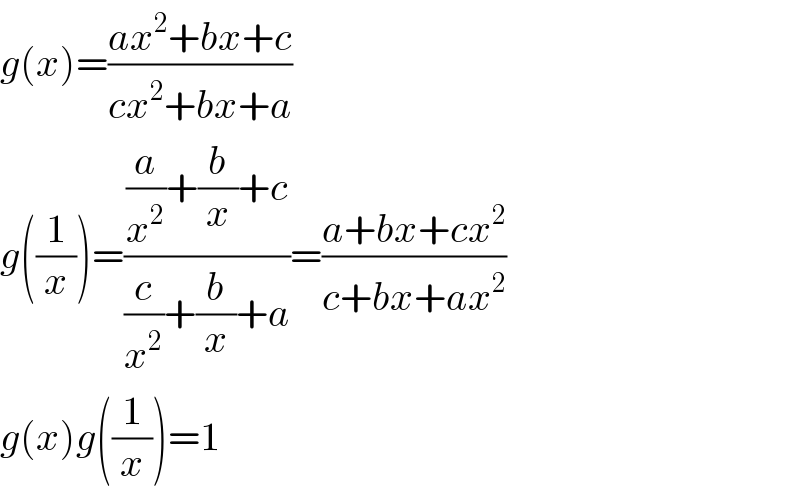
$${g}\left({x}\right)=\frac{{ax}^{\mathrm{2}} +{bx}+{c}}{{cx}^{\mathrm{2}} +{bx}+{a}} \\ $$$${g}\left(\frac{\mathrm{1}}{{x}}\right)=\frac{\frac{{a}}{{x}^{\mathrm{2}} }+\frac{{b}}{{x}}+{c}}{\frac{{c}}{{x}^{\mathrm{2}} }+\frac{{b}}{{x}}+{a}}=\frac{{a}+{bx}+{cx}^{\mathrm{2}} }{{c}+{bx}+{ax}^{\mathrm{2}} } \\ $$$${g}\left({x}\right){g}\left(\frac{\mathrm{1}}{{x}}\right)=\mathrm{1} \\ $$
Commented by mrW1 last updated on 01/Jul/17
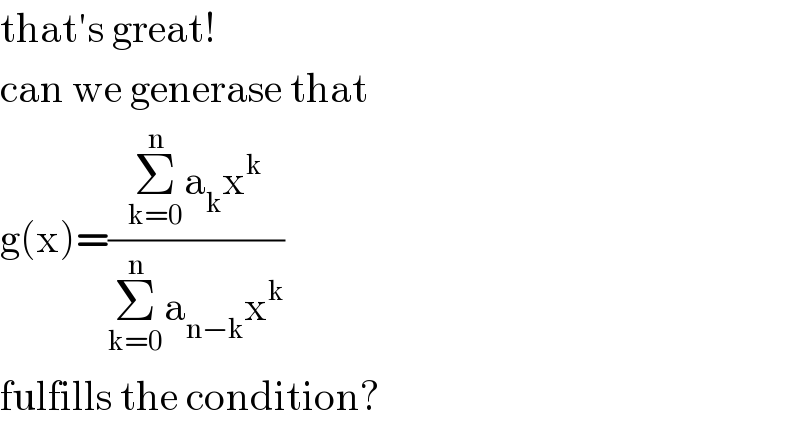
$$\mathrm{that}'\mathrm{s}\:\mathrm{great}! \\ $$$$\mathrm{can}\:\mathrm{we}\:\mathrm{generase}\:\mathrm{that} \\ $$$$\mathrm{g}\left(\mathrm{x}\right)=\frac{\underset{\mathrm{k}=\mathrm{0}} {\overset{\mathrm{n}} {\sum}}\mathrm{a}_{\mathrm{k}} \mathrm{x}^{\mathrm{k}} }{\underset{\mathrm{k}=\mathrm{0}} {\overset{\mathrm{n}} {\sum}}\mathrm{a}_{\mathrm{n}−\mathrm{k}} \mathrm{x}^{\mathrm{k}} } \\ $$$$\mathrm{fulfills}\:\mathrm{the}\:\mathrm{condition}? \\ $$
Commented by mrW1 last updated on 01/Jul/17

$$\mathrm{that}\:\mathrm{means}\:\mathrm{for}\:\mathrm{f}\left(\mathrm{3}\right)=\mathrm{28}\:\mathrm{there}\:\mathrm{is}\:\mathrm{no} \\ $$$$\mathrm{unique}\:\mathrm{solution}\:\mathrm{for}\:\mathrm{f}\left(\mathrm{4}\right). \\ $$$$\mathrm{thank}\:\mathrm{you}\:\mathrm{for}\:\mathrm{showing}\:\mathrm{me}\:\mathrm{the} \\ $$$$\mathrm{right}\:\mathrm{thinking}\:\mathrm{direction}! \\ $$
Commented by 1234Hello last updated on 02/Jul/17
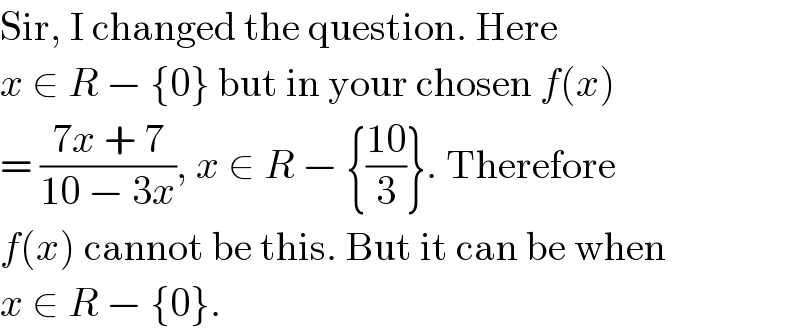
$$\mathrm{Sir},\:\mathrm{I}\:\mathrm{changed}\:\mathrm{the}\:\mathrm{question}.\:\mathrm{Here} \\ $$$${x}\:\in\:{R}\:−\:\left\{\mathrm{0}\right\}\:\mathrm{but}\:\mathrm{in}\:\mathrm{your}\:\mathrm{chosen}\:{f}\left({x}\right) \\ $$$$=\:\frac{\mathrm{7}{x}\:+\:\mathrm{7}}{\mathrm{10}\:−\:\mathrm{3}{x}},\:{x}\:\in\:{R}\:−\:\left\{\frac{\mathrm{10}}{\mathrm{3}}\right\}.\:\mathrm{Therefore} \\ $$$${f}\left({x}\right)\:\mathrm{cannot}\:\mathrm{be}\:\mathrm{this}.\:\mathrm{But}\:\mathrm{it}\:\mathrm{can}\:\mathrm{be}\:\mathrm{when} \\ $$$${x}\:\in\:{R}\:−\:\left\{\mathrm{0}\right\}. \\ $$
Commented by prakash jain last updated on 02/Jul/17
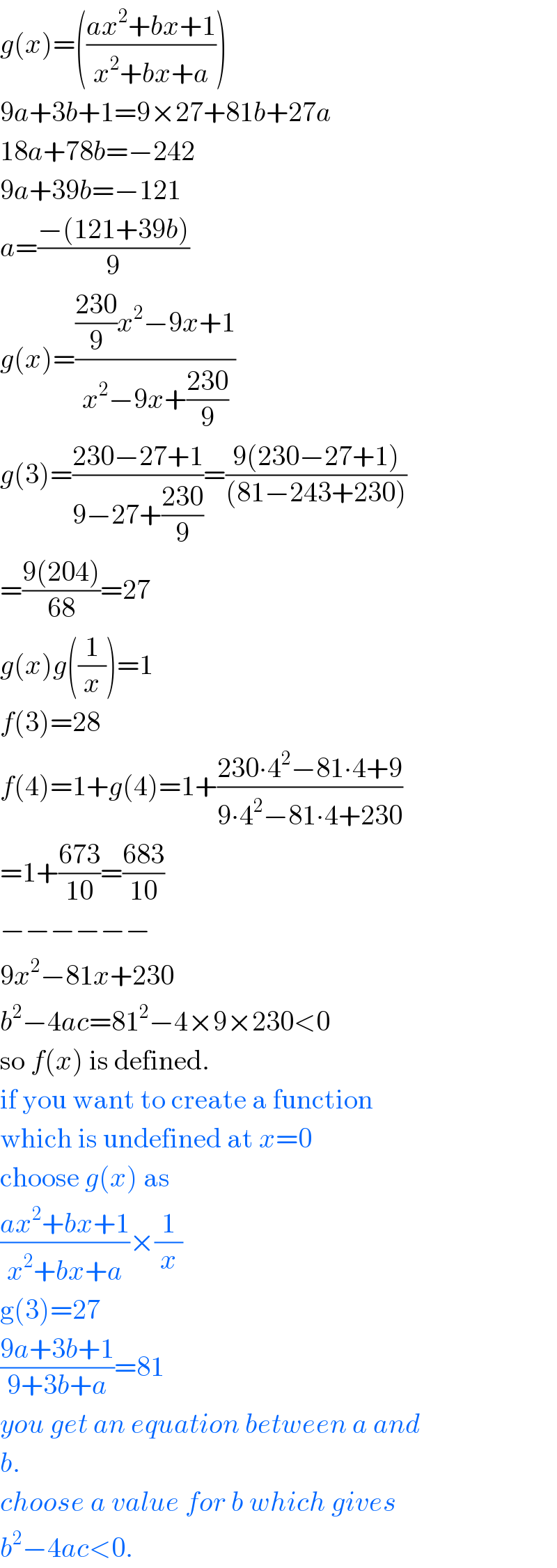
$${g}\left({x}\right)=\left(\frac{{ax}^{\mathrm{2}} +{bx}+\mathrm{1}}{{x}^{\mathrm{2}} +{bx}+{a}}\right) \\ $$$$\mathrm{9}{a}+\mathrm{3}{b}+\mathrm{1}=\mathrm{9}×\mathrm{27}+\mathrm{81}{b}+\mathrm{27}{a} \\ $$$$\mathrm{18}{a}+\mathrm{78}{b}=−\mathrm{242} \\ $$$$\mathrm{9}{a}+\mathrm{39}{b}=−\mathrm{121} \\ $$$${a}=\frac{−\left(\mathrm{121}+\mathrm{39}{b}\right)}{\mathrm{9}} \\ $$$${g}\left({x}\right)=\frac{\frac{\mathrm{230}}{\mathrm{9}}{x}^{\mathrm{2}} −\mathrm{9}{x}+\mathrm{1}}{{x}^{\mathrm{2}} −\mathrm{9}{x}+\frac{\mathrm{230}}{\mathrm{9}}} \\ $$$${g}\left(\mathrm{3}\right)=\frac{\mathrm{230}−\mathrm{27}+\mathrm{1}}{\mathrm{9}−\mathrm{27}+\frac{\mathrm{230}}{\mathrm{9}}}=\frac{\mathrm{9}\left(\mathrm{230}−\mathrm{27}+\mathrm{1}\right)}{\left(\mathrm{81}−\mathrm{243}+\mathrm{230}\right)} \\ $$$$=\frac{\mathrm{9}\left(\mathrm{204}\right)}{\mathrm{68}}=\mathrm{27} \\ $$$${g}\left({x}\right){g}\left(\frac{\mathrm{1}}{{x}}\right)=\mathrm{1} \\ $$$${f}\left(\mathrm{3}\right)=\mathrm{28} \\ $$$${f}\left(\mathrm{4}\right)=\mathrm{1}+{g}\left(\mathrm{4}\right)=\mathrm{1}+\frac{\mathrm{230}\centerdot\mathrm{4}^{\mathrm{2}} −\mathrm{81}\centerdot\mathrm{4}+\mathrm{9}}{\mathrm{9}\centerdot\mathrm{4}^{\mathrm{2}} −\mathrm{81}\centerdot\mathrm{4}+\mathrm{230}} \\ $$$$=\mathrm{1}+\frac{\mathrm{673}}{\mathrm{10}}=\frac{\mathrm{683}}{\mathrm{10}} \\ $$$$−−−−−− \\ $$$$\mathrm{9}{x}^{\mathrm{2}} −\mathrm{81}{x}+\mathrm{230} \\ $$$${b}^{\mathrm{2}} −\mathrm{4}{ac}=\mathrm{81}^{\mathrm{2}} −\mathrm{4}×\mathrm{9}×\mathrm{230}<\mathrm{0} \\ $$$$\mathrm{so}\:{f}\left({x}\right)\:\mathrm{is}\:\mathrm{defined}. \\ $$$$\mathrm{if}\:\mathrm{you}\:\mathrm{want}\:\mathrm{to}\:\mathrm{create}\:\mathrm{a}\:\mathrm{function} \\ $$$$\mathrm{which}\:\mathrm{is}\:\mathrm{undefined}\:\mathrm{at}\:{x}=\mathrm{0} \\ $$$$\mathrm{choose}\:{g}\left({x}\right)\:\mathrm{as} \\ $$$$\frac{{ax}^{\mathrm{2}} +{bx}+\mathrm{1}}{{x}^{\mathrm{2}} +{bx}+{a}}×\frac{\mathrm{1}}{{x}} \\ $$$$\mathrm{g}\left(\mathrm{3}\right)=\mathrm{27} \\ $$$$\frac{\mathrm{9}{a}+\mathrm{3}{b}+\mathrm{1}}{\mathrm{9}+\mathrm{3}{b}+{a}}=\mathrm{81} \\ $$$${you}\:{get}\:{an}\:{equation}\:{between}\:{a}\:{and} \\ $$$${b}. \\ $$$${choose}\:{a}\:{value}\:{for}\:{b}\:{which}\:{gives} \\ $$$${b}^{\mathrm{2}} −\mathrm{4}{ac}<\mathrm{0}. \\ $$
Commented by mrW1 last updated on 02/Jul/17
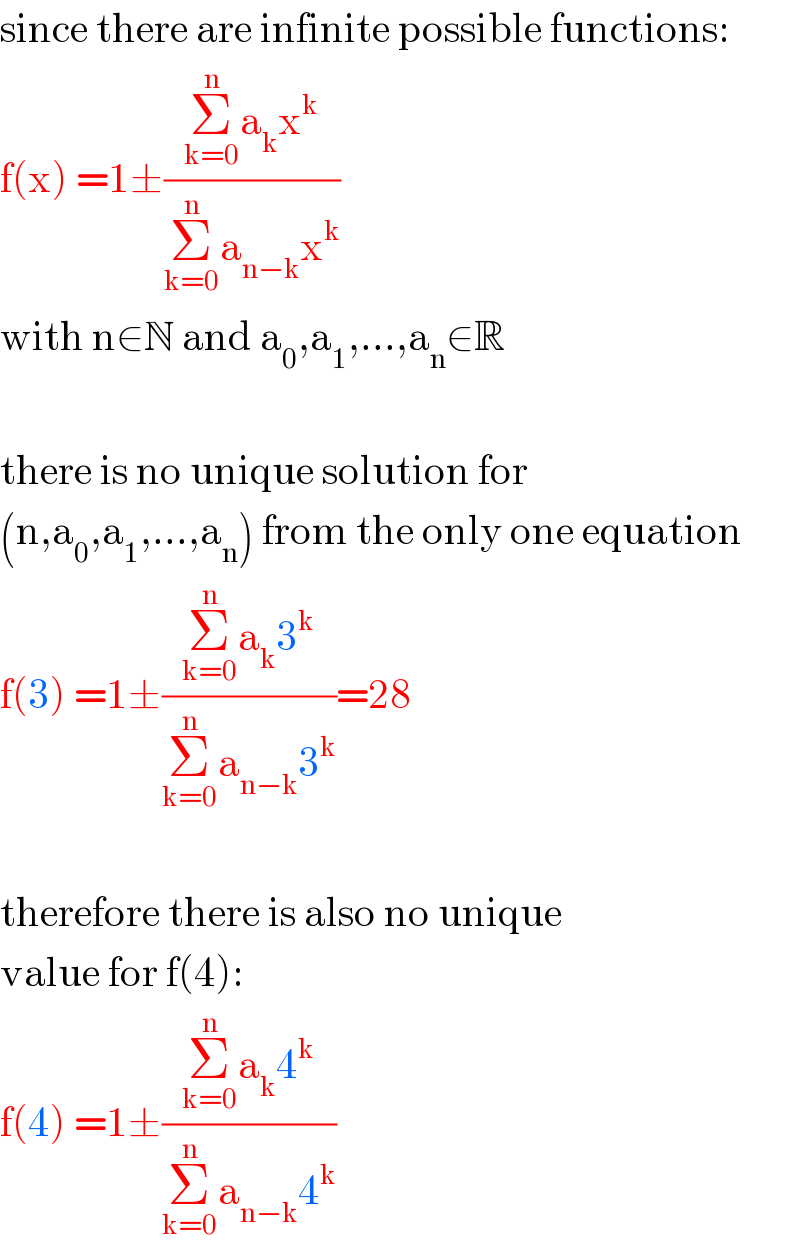
$$\mathrm{since}\:\mathrm{there}\:\mathrm{are}\:\mathrm{infinite}\:\mathrm{possible}\:\mathrm{functions}: \\ $$$$\mathrm{f}\left(\mathrm{x}\right)\:=\mathrm{1}\pm\frac{\underset{\mathrm{k}=\mathrm{0}} {\overset{\mathrm{n}} {\sum}}\mathrm{a}_{\mathrm{k}} \mathrm{x}^{\mathrm{k}} }{\underset{\mathrm{k}=\mathrm{0}} {\overset{\mathrm{n}} {\sum}}\mathrm{a}_{\mathrm{n}−\mathrm{k}} \mathrm{x}^{\mathrm{k}} } \\ $$$$\mathrm{with}\:\mathrm{n}\in\mathbb{N}\:\mathrm{and}\:\mathrm{a}_{\mathrm{0}} ,\mathrm{a}_{\mathrm{1}} ,...,\mathrm{a}_{\mathrm{n}} \in\mathbb{R} \\ $$$$ \\ $$$$\mathrm{there}\:\mathrm{is}\:\mathrm{no}\:\mathrm{unique}\:\mathrm{solution}\:\mathrm{for}\: \\ $$$$\left(\mathrm{n},\mathrm{a}_{\mathrm{0}} ,\mathrm{a}_{\mathrm{1}} ,...,\mathrm{a}_{\mathrm{n}} \right)\:\mathrm{from}\:\mathrm{the}\:\mathrm{only}\:\mathrm{one}\:\mathrm{equation} \\ $$$$\mathrm{f}\left(\mathrm{3}\right)\:=\mathrm{1}\pm\frac{\underset{\mathrm{k}=\mathrm{0}} {\overset{\mathrm{n}} {\sum}}\mathrm{a}_{\mathrm{k}} \mathrm{3}^{\mathrm{k}} }{\underset{\mathrm{k}=\mathrm{0}} {\overset{\mathrm{n}} {\sum}}\mathrm{a}_{\mathrm{n}−\mathrm{k}} \mathrm{3}^{\mathrm{k}} }=\mathrm{28} \\ $$$$ \\ $$$$\mathrm{therefore}\:\mathrm{there}\:\mathrm{is}\:\mathrm{also}\:\mathrm{no}\:\mathrm{unique} \\ $$$$\mathrm{value}\:\mathrm{for}\:\mathrm{f}\left(\mathrm{4}\right): \\ $$$$\mathrm{f}\left(\mathrm{4}\right)\:=\mathrm{1}\pm\frac{\underset{\mathrm{k}=\mathrm{0}} {\overset{\mathrm{n}} {\sum}}\mathrm{a}_{\mathrm{k}} \mathrm{4}^{\mathrm{k}} }{\underset{\mathrm{k}=\mathrm{0}} {\overset{\mathrm{n}} {\sum}}\mathrm{a}_{\mathrm{n}−\mathrm{k}} \mathrm{4}^{\mathrm{k}} } \\ $$
Commented by prakash jain last updated on 02/Jul/17
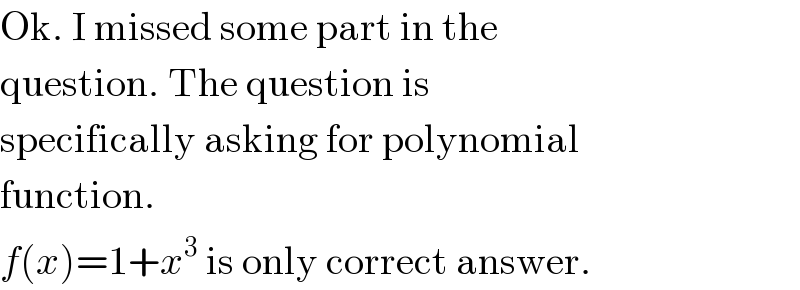
$$\mathrm{Ok}.\:\mathrm{I}\:\mathrm{missed}\:\mathrm{some}\:\mathrm{part}\:\mathrm{in}\:\mathrm{the} \\ $$$$\mathrm{question}.\:\mathrm{The}\:\mathrm{question}\:\mathrm{is} \\ $$$$\mathrm{specifically}\:\mathrm{asking}\:\mathrm{for}\:\mathrm{polynomial} \\ $$$$\mathrm{function}. \\ $$$${f}\left({x}\right)=\mathrm{1}+{x}^{\mathrm{3}} \:\mathrm{is}\:\mathrm{only}\:\mathrm{correct}\:\mathrm{answer}. \\ $$
Commented by mrW1 last updated on 02/Jul/17
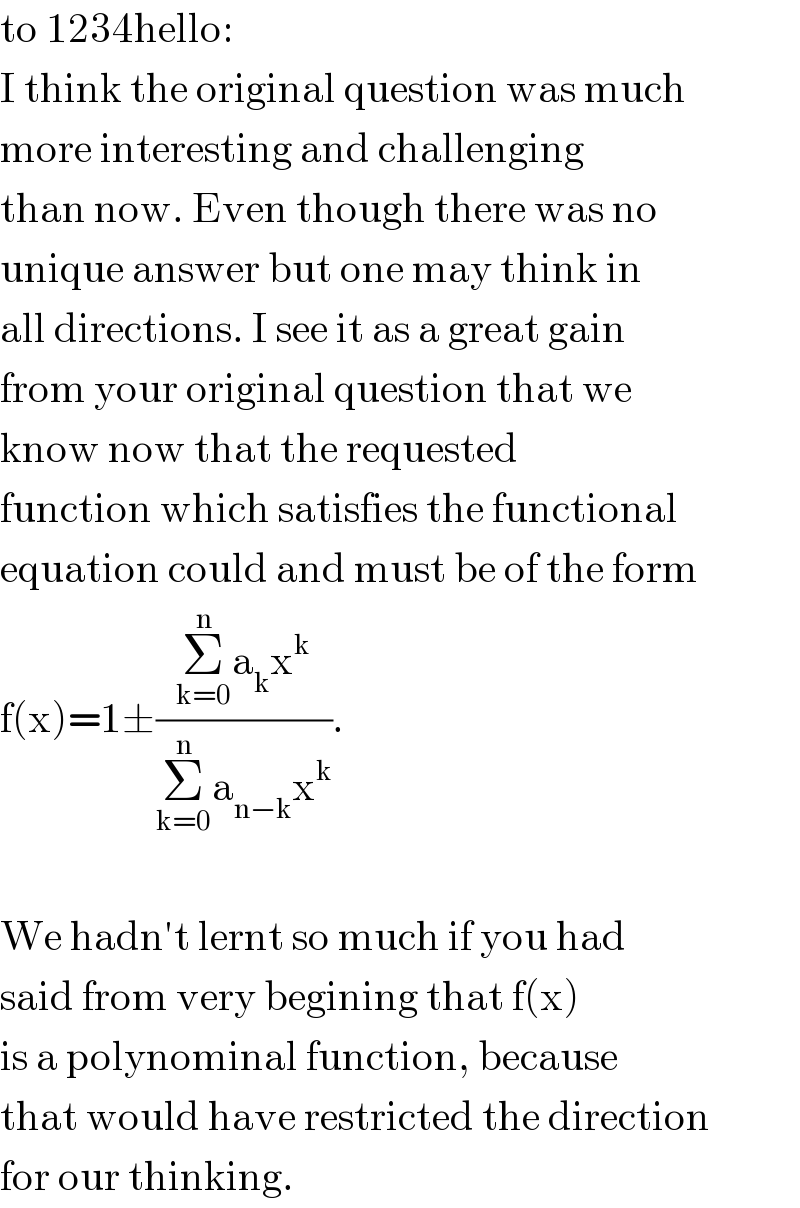
$$\mathrm{to}\:\mathrm{1234hello}: \\ $$$$\mathrm{I}\:\mathrm{think}\:\mathrm{the}\:\mathrm{original}\:\mathrm{question}\:\mathrm{was}\:\mathrm{much} \\ $$$$\mathrm{more}\:\mathrm{interesting}\:\mathrm{and}\:\mathrm{challenging} \\ $$$$\mathrm{than}\:\mathrm{now}.\:\mathrm{Even}\:\mathrm{though}\:\mathrm{there}\:\mathrm{was}\:\mathrm{no} \\ $$$$\mathrm{unique}\:\mathrm{answer}\:\mathrm{but}\:\mathrm{one}\:\mathrm{may}\:\mathrm{think}\:\mathrm{in} \\ $$$$\mathrm{all}\:\mathrm{directions}.\:\mathrm{I}\:\mathrm{see}\:\mathrm{it}\:\mathrm{as}\:\mathrm{a}\:\mathrm{great}\:\mathrm{gain} \\ $$$$\mathrm{from}\:\mathrm{your}\:\mathrm{original}\:\mathrm{question}\:\mathrm{that}\:\mathrm{we} \\ $$$$\mathrm{know}\:\mathrm{now}\:\mathrm{that}\:\mathrm{the}\:\mathrm{requested} \\ $$$$\mathrm{function}\:\mathrm{which}\:\mathrm{satisfies}\:\mathrm{the}\:\mathrm{functional} \\ $$$$\mathrm{equation}\:\mathrm{could}\:\mathrm{and}\:\mathrm{must}\:\mathrm{be}\:\mathrm{of}\:\mathrm{the}\:\mathrm{form} \\ $$$$\mathrm{f}\left(\mathrm{x}\right)=\mathrm{1}\pm\frac{\underset{\mathrm{k}=\mathrm{0}} {\overset{\mathrm{n}} {\sum}}\mathrm{a}_{\mathrm{k}} \mathrm{x}^{\mathrm{k}} }{\underset{\mathrm{k}=\mathrm{0}} {\overset{\mathrm{n}} {\sum}}\mathrm{a}_{\mathrm{n}−\mathrm{k}} \mathrm{x}^{\mathrm{k}} }. \\ $$$$ \\ $$$$\mathrm{We}\:\mathrm{hadn}'\mathrm{t}\:\mathrm{lernt}\:\mathrm{so}\:\mathrm{much}\:\mathrm{if}\:\mathrm{you}\:\mathrm{had} \\ $$$$\mathrm{said}\:\mathrm{from}\:\mathrm{very}\:\mathrm{begining}\:\mathrm{that}\:\mathrm{f}\left(\mathrm{x}\right) \\ $$$$\mathrm{is}\:\mathrm{a}\:\mathrm{polynominal}\:\mathrm{function},\:\mathrm{because} \\ $$$$\mathrm{that}\:\mathrm{would}\:\mathrm{have}\:\mathrm{restricted}\:\mathrm{the}\:\mathrm{direction} \\ $$$$\mathrm{for}\:\mathrm{our}\:\mathrm{thinking}. \\ $$
Commented by 1234Hello last updated on 03/Jul/17

$$\mathrm{But}\:\mathrm{this}\:\mathrm{was}\:\mathrm{the}\:\mathrm{original}\:\mathrm{question}!\:\mathrm{I} \\ $$$$\mathrm{was}\:\mathrm{in}\:\mathrm{a}\:\mathrm{hurry}\:\mathrm{so}\:\mathrm{I}\:\mathrm{first}\:\mathrm{posted}\:\mathrm{that} \\ $$$$\mathrm{version}.\:\mathrm{Thanks}\:\mathrm{all}\:\mathrm{for}\:\mathrm{your}\:\mathrm{efforts}! \\ $$
